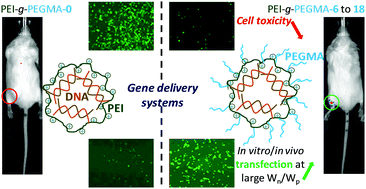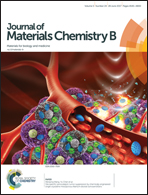Tunable PEGylation of branch-type PEI/DNA polyplexes with a compromise of low cytotoxicity and high transgene expression: in vitro and in vivo gene delivery
Abstract
Although PEGylated polyplexes for gene delivery are widespread, there is a need for an in-depth investigation of the role of the PEGylation degree on the delivery efficiency of the systems. For this, a low-toxicity series of polymers for gene delivery were designed via Michael addition of poly(ethylene glycol)methyl ether methacrylate (PEGMA) onto branched polyethylenimine PEI. The goal was to finely tune the PEGylation degree in order to determine the system offering the best compromise between low cytotoxicity and high transfection efficiency under both in vitro and in vivo conditions. From dynamic light scattering tests, zeta potential measurements and gel retardation assay, it was found that nanoparticle assembly of PEI-g-PEGMA and DNA exhibited stable complex formation when the PEGylation degree was below 2.9%. In addition, complexes formed from polymers with a PEGylation degree of at least 1.67% (from PEI-g-PEGMA-6 to PEI-g-PEGMA-18) all showed very low hemolysis activity. Transfection efficiencies of the prepared complexes were determined using the pEGFP-C3 vector and β-galactosidase. Complexes made of PEI-g-PEGMA-6 and PEI-g-PEGMA-10 at a polymer nitrogen/DNA phosphorus weight ratio (Wn/Wp) of 5 led to the best transfection efficiencies. Moreover, PEGylation ensured low cytotoxicity of the complexes in particular at high Wn/Wp ratios. In vivo tests in a mouse model confirmed the in vitro results obtained for PEI-g-PEGMA-6-based complexes, at all Wn/Wp ratios tested, but also showed that a high PEGylation degree (5.2% for PEI-g-PEGMA-18), though inefficient in vitro could still lead to successful delivery in vivo, due to a prolonged contact time between the complex and the cells, and to the change in the biological environment. Overall, provided a fine tuning of the grafting density of PEGMA onto PEI and the polymer nitrogen/DNA phosphorus weight ratio, our results prove that PEI-g-PEGMA polymers constitute an efficient platform for successful in vitro and in vivo gene delivery, and ensure low cytotoxicity and prolonged cell viability.



 Please wait while we load your content...
Please wait while we load your content...